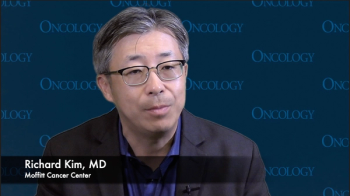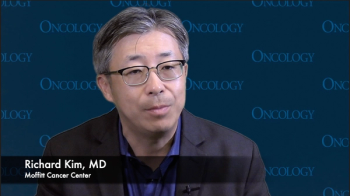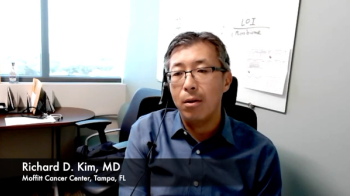
Richard Kim, MD, highlights future research efforts examining immunotherapy/chemotherapy combinations for patients with metastatic colorectal cancer.

Your AI-Trained Oncology Knowledge Connection!


Richard Kim, MD, highlights future research efforts examining immunotherapy/chemotherapy combinations for patients with metastatic colorectal cancer.

Richard Kim, MD, discussed key findings of the phase 1b KEYNOTE-651 trial, examining pembrolizumab plus standard chemotherapy in patients with microsatellite-stable or mismatch repair–proficient colorectal cancer.

During the 2022 American Society of Clinical Oncology Annual Meeting, Richard Kim, MD, discusses the rationale for the phase 1b KEYNOTE-651 trial examining pembrolizumab plus chemotherapy in metastatic colorectal cancer.

Liliana Bustamante, MD, and Richard Kim, MD, discuss circulating tumor DNA as a potential prognostic biomarker for patients with colorectal cancer.

Richard Kim, MD, and Lilliana Bustamante, MD, discuss the potnetial for using ctDNA to treat patients with oligometastatic colorectal cancer.

Drs Liliana Bustamante and Richard Kim react to limitations surrounding biomarkers used in colorectal cancer and consider how to best study the role of ctDNA moving forward.

The potential impact that conclusions highlighted in a recent paper on postoperative MRD analysis in colorectal cancer may have on the management of patients with GI cancers.

Following presentation of a paper by Loupakis F, et al., Drs Liliana Bustamante and Richard Kim raise questions pertaining to the use of ctDNA as a biomarker when managing patients with metastatic colorectal cancer undergoing resection.

An overview of what is currently understood about the use of ctDNA assays to help guide treatment decisions when managing patients with colorectal cancer undergoing resection of metastases.

Drs Liliana Bustamante and Richard Kim explore conclusions highlighted by a paper on postoperative MRD analysis as a strong prognostic biomarker in colorectal cancer.

Drs Liliana Bustamante and Richard Kim review “Detection of Molecular Residual Disease Using Personalized Circulating Tumor DNA Assay in Patients With Colorectal Cancer Undergoing Resection of Metastases,” by Loupakis F, et al.

CancerNetwork® sat down with Richard D. Kim, MD, of the Moffitt Cancer Center at the 2021 ASCO Annual Meeting to talk about the many ways oncologists can approach treating hepatocellular carcinoma with combination regimens.

In this review article we will discuss the current data on, and future role of, sorafenib in the treatment of hepatocellular carcinoma beyond Child-Pugh A cirrhosis, in conjunction with local therapy, and in a transplant setting.

This review summarizes the current data on efficacy and rationale of adjuvant treatment for hepatocellular cancer after orthotopic liver transplantation, as well as future prospects. No adjuvant treatment is currently advocated.

Pancreatic cancer is the fourth leading cause of cancer mortality in the United States. According the American Cancer Society, about 37,680 new cases are anticipated in the year 2008, and 34,290 patients will die from the disease.[1] This malignancy is a very aggressive tumor, and patients often present with advanced-stage disease. Surgical resection, when possible, provides the only opportunity for cure. Even with R0 resection, pancreatic cancer still carries an overall dismal prognosis, and therefore adjuvant treatment is offered.

Hepatocellular carcinoma (HCC) is an aggressive tumor that often occurs in the setting of chronic liver disease and cirrhosis. The incidence of hepatocellular carcinoma is increasing in the United States and worldwide. Orthotopic liver transplantation (OLT) is a viable and potentially curative option for selected patients with HCC. Locoregional therapy has been used to control HCC before transplantation because of the limited number of donor organs, to prevent tumor progression, and to decrease the incidence of dropouts from the transplant waiting list. Traditionally, multiple investigational locoregional modalities such as tumor resection, radiofrequency ablation, transarterial chemoembolization, and systemic chemotherapy have been used as "bridging" therapies. While the investigation of novel neoadjuvant treatments is justified in an effort to prevent tumor progression, the absence of randomized controlled trials leaves uncertainty about the utility of these maneuvers in improving outcome. This review summarizes the current data on the different modalities used worldwide in the neoadjuvant treatment of hepatocellular carcinoma, the rationale for these approaches, efficacy, potential complications, and future prospects.

Published: September 1st 2008 | Updated:

Published: December 16th 2009 | Updated:

Published: March 15th 2011 | Updated:

Published: August 1st 2007 | Updated: